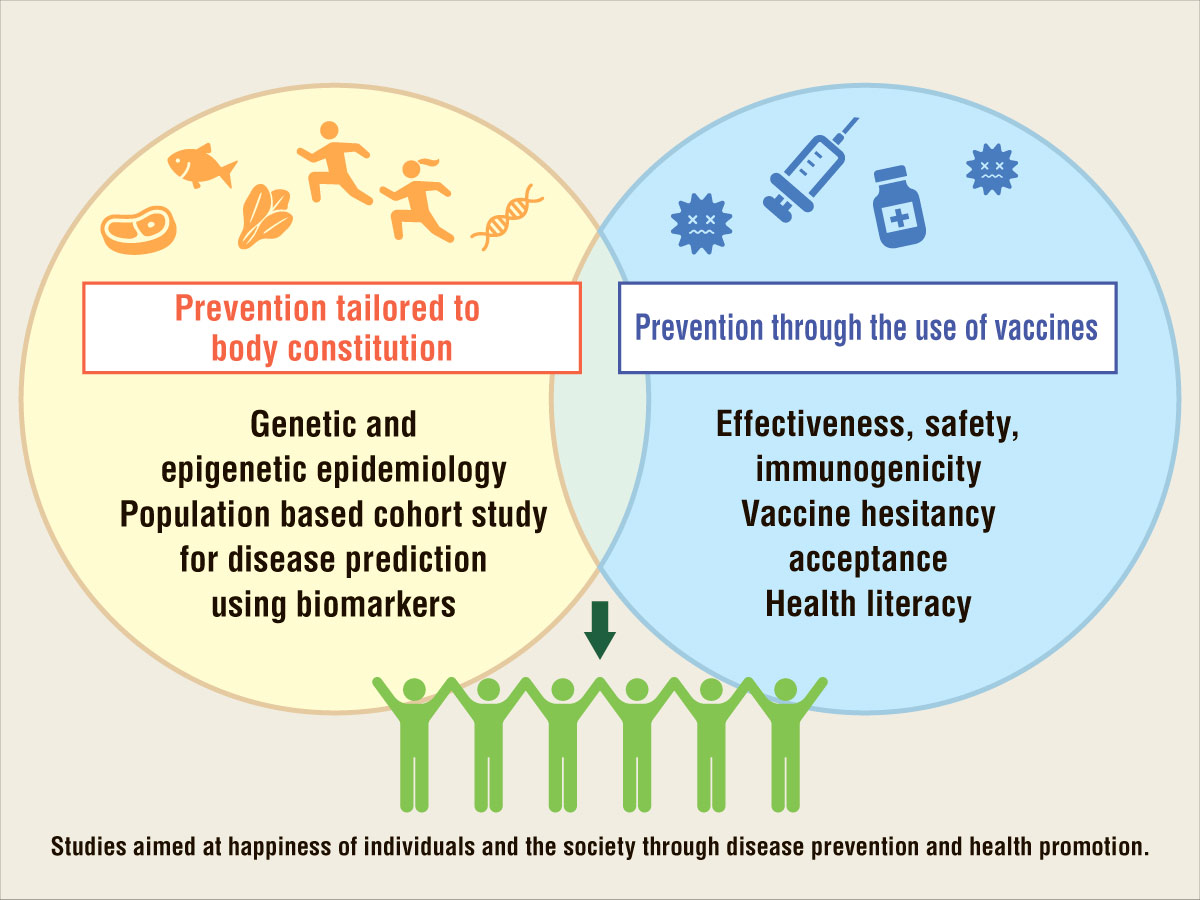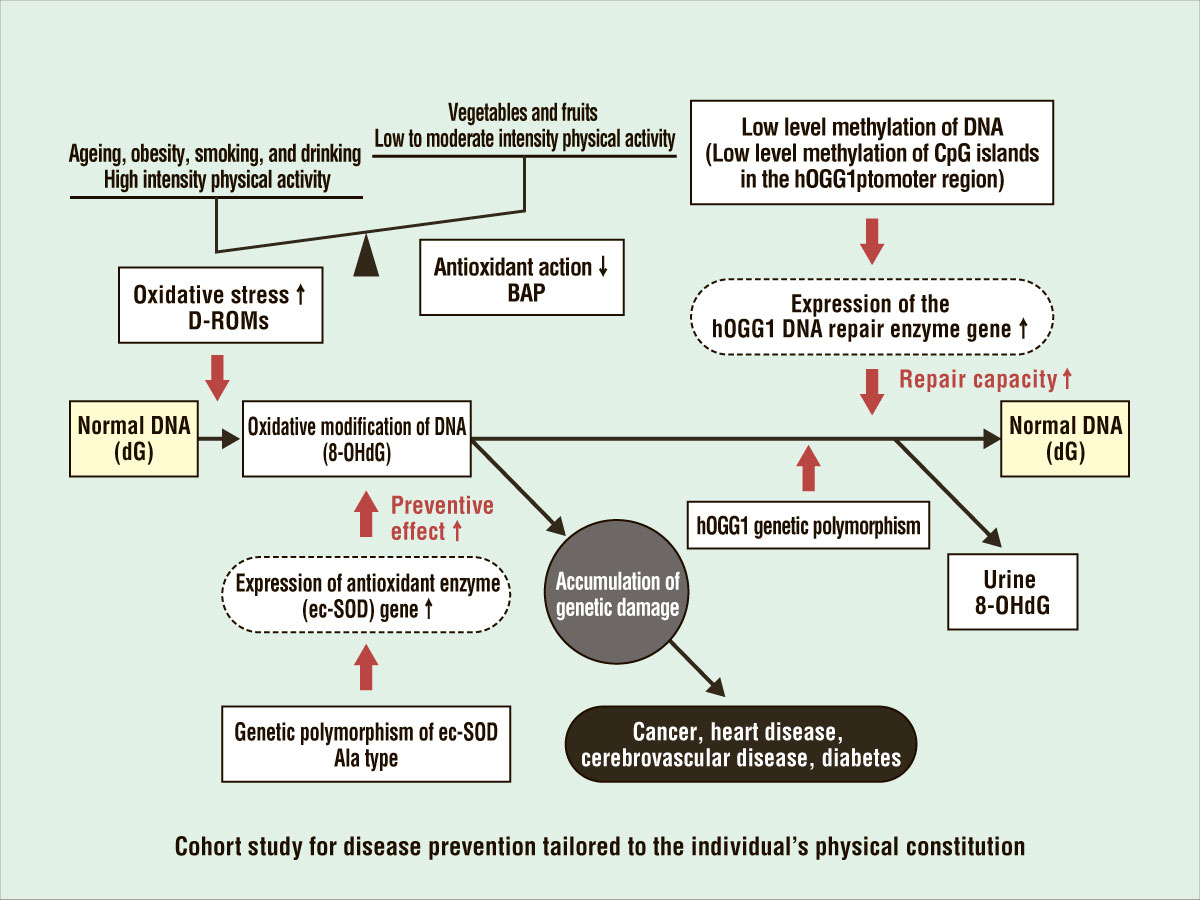A study aimed at achieving happiness of people and the society through disease prevention and health promotion
Research Fields
Genomic and epigenomic epidemiology, vaccine epidemiology, preventive medicine, health behavioral science and public health
Keywords
Prevention, genome, healthy ageing, vaccine, and health education
Research overview
The aim is to realize a happy society through epidemiological studies on disease prevention and health promotion Disease prevention through epidemiological studies
Health is the most important factor in supporting the era of 100-year lifespans. In order to contribute to the realization of a happy society, I am continuing my research in two major thrust areas, namely, health promotion and disease prevention.
■ Genome cohort study
Since 2005, we have been conducting a genome cohort study of about 12,000 citizens of Saga city (40 to 69 years old at the start of the study). This is a part of a joint study involving more than 10 research institutions all over Japan, with 100,000 participants. This study is still ongoing and we conduct health status surveys once every five years. We aim at finding clues about preventive measures for lifestyle diseases according to the constitution of the individuals by clarifying how genomic information, blood and urine biomarkers, and physical activity information collected from the citizens are associated with the onset of cancer, heart disease, cerebrovascular disease, and diabetes. At the same time, we are also conducting research aimed at finding anti-aging and healthy aging effects, focusing on antioxidant and anti-inflammatory activities, and gene repair. Based on the knowledge gained from this research, we also provide guidance on stopping smoking and appropriate diet.
■ Disease prevention with vaccine
Vaccines are attracting attention due to the global pandemic of novel coronavirus infections. What we are doing is to evaluate the effectiveness, safety, cost-effectiveness, vaccination hesitancy, etc. of developed and/or approved vaccines (for novel coronavirus, influenza, pertussis, rotavirus, HPV, mumps, etc.), and utilize them for disease prevention and formulation of vaccination policies. In an increasingly globalized society, new threats of infectious diseases are likely to occur in the future also, and vaccine-based prevention would become even more important, I believe.
In the future, we would like to build up evidence for disease prevention and health promotion through these two studies and propose preventive methods that are useful in the real world. Collaborative research with scientists in the fields of behavioral economics, psychology, and communication is also necessary to convey the information correctly. In addition, we will aim at giving back to the society the fruits of research conducted so far, in the form of easy to understand methods and more user-friendly systems, by expanding our vision to include wearable devices that can be worn on the arms and wrists, and IT devices, as a means to promote changes in individual behavior.
Message
Health is essential for people to live happily in the era of 100-year lifespans. Prevention of emerging and re-emerging infectious diseases that may occur in future in the global society, including disease prevention and health promotion according to the individual’s genetic risks, is also an important issue in health protection. I would like to build up evidence for preventive measures tailored to the person’s body constitution and for prevention with vaccines, through epidemiological studies, and propose preventive methods that are useful in the real world.
Main publications
- Hara M, et al. Genome-wide association study of leisure-time exercise behavior in Japanese adults. Med Sci Sports Exerc. 2018: 50(12), 2433-2411.
- Hara M, et al. Intensity-specific effect of physical activity on urinary levels of 8-hydroxydeoxyguanosine in middle-aged Japanese. Cancer Science. 2016: 107 (11), 1653-1659.
- Hara M.et al. Synergistic effect of hypertension and smoking on the total small vessel disease score in healthy individuals: the Kashima scan study. Hypertens Res. 2019: 42 (11), 1738-1744.
- Hara M, Hirota Y. Basic principle of population-based cohort study to evaluate influenza vaccine effectiveness among elderly Japanese. Vaccine. 2017: 35 (36), 4791-4795.
- Hara M, et al. Determinants of self-paid rotavirus vaccination status in Kanazawa, Japan, including socioeconomic factors, parents' perception, and children's characteristics. BMC Infect Dis. 2020: 20 (1), 712.








